Text

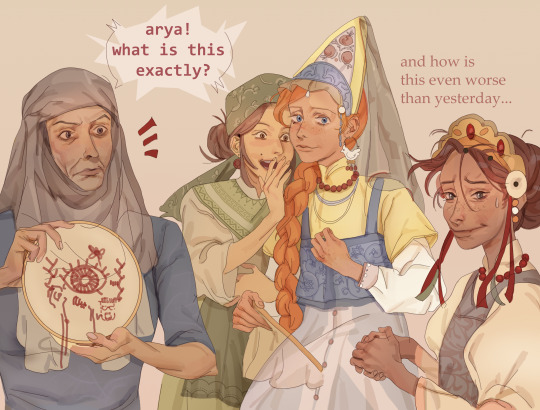
arya was having trouble finishing her homework
it turned into a group project
3K notes
·
View notes
Text
Everytime I think about how millennials complain about gen z again and again about how they’re soft and puritanical I always think about this specific passage from zadie smith’s review of tar

42 notes
·
View notes
Photo
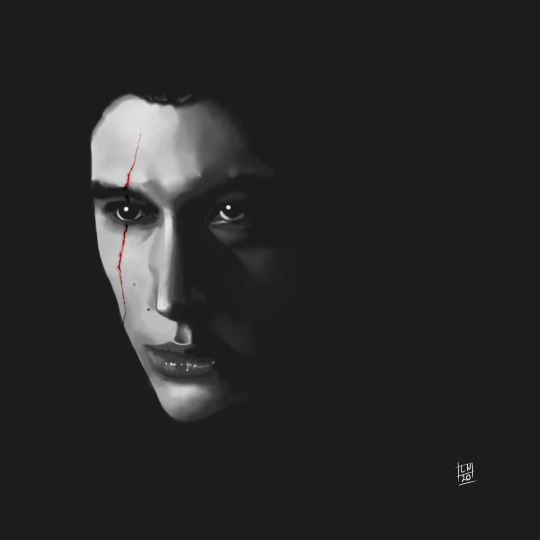
It’s been way too long since I’ve last drawn him
85 notes
·
View notes
Text

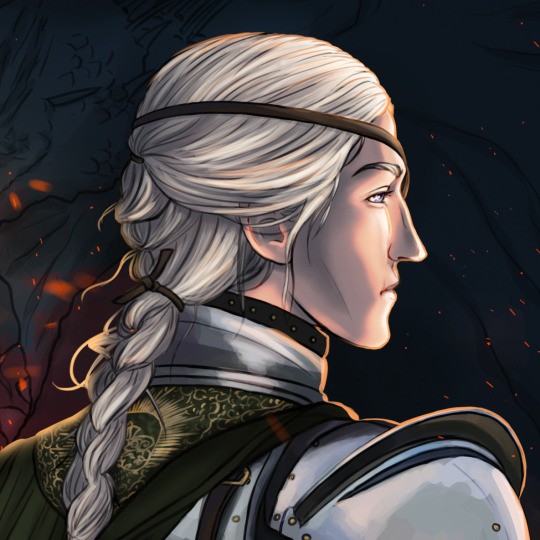
"But the day was as black as Prince Aemond's heart."
4K notes
·
View notes
Note
thoughts on aemond and daemon, respectively?
Two of my favorite characters. Those that say Aemond is a one-note cartoon in the books are absolute fools, I tell you. He’s so incredibly complex and tragic. (My other two faves are Rhaenyra and Alicent.)
I’ve already spoken about Daemon being a Byronic hero: mad, bad, dangerous to know, traumatized but driven by love. Aemond is himself another Byronic hero. But there’s another difference: Aemond is Daemon’s Jungian shadow in the classic sense.
I’ll also say that while a lot of people think of the Dance as bad people hurting bad people, I actually find it much like Othello or Hamlet: a tragedy, to be sure, but the tragedy is because the characters have so many great points that seeing them fall is painful. I don’t think anyone involved is a “bad” person besides perhaps Aegon the Elder.
Some thoughts in what follows are taken from @linkspooky
Love: Daemon and Aemond
Daemon’s love is defined by love, both given and received. Aemond’s is defined by duty and the lack of receiving love.
You silly girl! cry the twitter mobs. Stop seeing this as a love story! To which I slide Wuthering Heights, a classic work of Romantic literature, over to them and say, please read. A love story is not always #goals.
Also, yeah, I said it. Aemond is the opposite of a cartoonish villain. He’s actually pretty defined by love too.
Daemon and Love

Daemon did not love his first wife, and he definitely had Rhea Royce murdered. No doubt there. I’m not excusing him but talking about complexity.
Then, enter Laena. And I think this is a tragic aspect of the show that they cut: the book says Laena taught Daemon to love. And she did. Rhaenyra loved her too (as more than friends, by the way).
Did Daemon kill Laenor in the books? Very possibly, yes. Did he want power? Yes. Do I think he loved Rhaenyra for more than just her claim?
Yes. I’m not getting into the grooming aspect; I’m talking after Laena. Laena taught him to love.
If he only wanted the crown, he could have killed his brother. But the books make it clear that despite their issues, Daemon loved his brother. He won wars for him.
The book also directly states Daemon named his children after loved ones: Rhaena after Laena’s mother. Baela after Daemon’s father. Viserys after his elder brother. Aegon after his younger brother. Yes, I see the common name being taken as a slight by Alicent, but it was also out of love for a brother who died while still a baby.
The man is an emotional wreck and lashes out at others because of it. That’s what a rogue is. Hence, the title “The Rogue Prince.” I’m not saying he’s a good person, because “a son for a son” was nauseating. I’m just saying that the story indicates Daemon is driven by love, but where he’s driven to isn’t always a great place.
Aemond and Love

Listen, Aemond is the most overlooked of Alicent’s kids. Not Daeron, who is well-loved by the common people along with Helaena. He’s also not the heir.
As a boy, Aemond just wanted to prove himself. Him taking Vhagar at the funeral of Laena was hurtful, but it was the innocent work of a child who didn’t fully grasp what he was doing. He’s not a monster for it. Luke taking Aemond’s eye is also the work of a kid who doesn’t fully understand what “permanent blindness” means. He’s only just experiencing death. These are children’s squabbles with greater consequences than intended.
He wants to prove himself because he lacks love. Viserys is a neglectful dad, and it’s not wrong to say his neglect is abusive towards Alicent’s kids. But Alicent, while I don’t doubt she loves her kids, also fails her kids. I’ll discuss this below.
When Aemond kills Luke in the book, it’s not “oopsie.” It’s framed as the lashing out of a boy who had no love, and it’s explicit in this framing.
Aemond literally arranges a deal with Storm’s End to agree to marry a girl he does not love. Love is a transaction for the Hightowers. The sister he does not pick then taunts him about his missing eye, so he kills Luke to prove to a girl he doesn’t even love and isn’t even promised to, that he is strong. If he has not love, he’ll at least have respect… right?
Alicent Loves Her Kids (Just Not Well)

Like Cersei, Alicent can both genuinely love her kids and fail them all the same. Again, like Cersei, it’s the trauma of having their bodies and love sold to a king for a transaction of power that cripples their understanding of love. In other words, Tywin and Otto are the blame first and foremost.
The show’s adaptation of the “eye for an eye” scene is good, because it makes the novel’s subtext actual text. The scene had nothing to do with Alicent requesting justice for her son and everything to do with lashing out at someone else and hurting them because she was hurting.
Viserys was a neglectful dad, but taking his grandkid’s eye? No. Who would that have helped? Ned Stark, the most loyal and moral character in the entire series besides perhaps Davos Seaworth, literally begs Robert in a parallel scene not to kill Sansa’s wolf. It’s seen as a turning point for Joffrey becoming worse, and it’s a turning point here too, for Aemond turning to cruelty.
Alicent, because of the lovelessness of her environment where her father sold her and she’s treated like less than a person, turns to violent retribution lashes out at people who are innocent (violence against children, almost like that’s a theme). She cuts Rhaenyra and Rhaenyra’s line “now they see you as you are” is meant to point out the reality: Alicent’s issue is with Rhaneyra, not with Luke. It’s not about Aemond. It’s about Alicent.
When Alicent dies in the books, her last words are about wanting to see her kids again and to see Jaehaerys. But the context is everything here.
When Alicent dies, she has a granddaughter left, and spends her time traumatizing the girl by telling her to slit her husband’s throat so the girl was sobbing and refusing to visit her. Her remembered Jaehaerys is not out of fondness or truth but regret and delusion, because Jaehaerys died thinking Alicent was Saera, the daughter he disowned, come to forgive him.
It is a scene that is filled with regret about how she failed her kids and grandkids, and dying choosing to believe a kind lie (that she was someone else) over reality, because at that point she doesn’t want to acknowledge what she knows: that she wishes she had become someone other than who she became. Still, the complexity enters in that she hurt her granddaughter up until the end. It’s regret but not honest regret—it looks everywhere but inwards. Alicent saw Rhaenyra as her Jungian shadow, and destroyed her instead of reconciling it.
Aemond and Duty

Aemond always tries to do the right thing by his family. But it gets him absolutely nothing. Even when he kills Luke, Alicent tells him he’s accursed for slaying his own kin. Just like Alicent targets Rhaenyra and lashes out at her continually for the lack of love in her life, so Aemond lashes out at others. But neither of them are lashing out at the right people.
Aemond always lashes out at those weaker than him. His victories are pyrrhic. He doesn’t want to fight those bigger and better than him despite his boasting not because he’s craven, but because he wants to prove himself worthy because what else does he have? When he eventually does fight Daemon, he loses.
Aemond goes to war for his brother, Aegon, but there’s no remarks of love between them. It’s duty Aemond cites all the time, and while I do think he acted out of loyalty for Aegon, it’s certainly not reciprocated. Compare that with Daemon and Viserys. For all their flaws, I do think they genuinely cared about each other. Aegon must take the crown because of duty. Even in the show, he is open to wedding Helaena if “duty commands it.” It’s the classic duty vs love, that age old tragic trope.
Aemond settles for duty, even though he wants love. But Martin’s books are never so simple as to paint love or duty as good or bad, black and white. No, it’s much more complex. So love doesn’t make anyone better inherently, but without it there’s no hope at all.
Daemon and Nettles
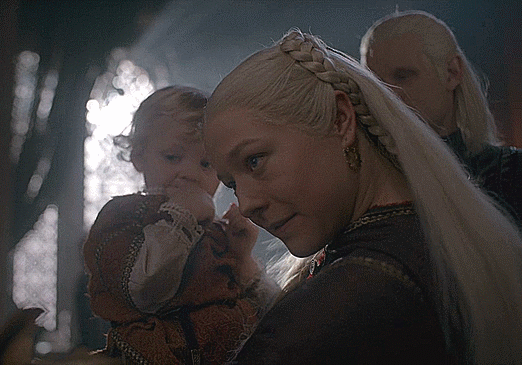
But if Daemon really loved Rhaenyra, why was he cheating with Nettles?
I… genuinely am not sure the intent of the story is that Daemon was cheating with Nettles. Before you accuse me of rose-tinted glasses, please here me out.
The book made it seem like two options: he was cheating or she was his daughter. However, when the text mentions rumors (which I’ve been paying attention to as I reread ASOIAF), it’s usually NOT one or the other, but usually a mixture of the two with some unknown third component there.
The problem is that both of the two options severely weaken a different theme.
Like, if Nettles is his daughter, that reinforces the idea that magic is only for a certain bloodlines, and while there is some truth to this in ASOIAF, it’s not fully the truth, and it seems very very odd to me that George would stick to this one fantasy trope and not deconstruct it like he usually does. Tyrion is most likely a dragon rider in ASOIAF alongside Jon and Dany, and it is much more powerful if he is not a Targaryen.
As for the more likely option–cheating–also weakens the themes because again, a queen is not paranoid and losing everyone if she’s right. I’ve seen some speculate Rhaenyra didn’t write that letter, but it is most likely that Rhaenyra did write that letter, because in a tragedy, she must bring about her own downfall. The problem is that it is a lot less thematically powerful if Rhaenyra is right about Daemon cheating on her.
The most powerful thematic option is if Daemon just saw a kid who had power and tried to protect her from the war. Maybe trying to get some insight into her powers, maybe not. But he loses Rhaenyra in the end because of her own inability to trust, and then what does Daemon do? He decides to essentially die tragically defeating Rhaenyra’s most formidable enemy: Aemond and Vhagar.
When there’s no love left, there’s still duty towards a queen.
Like, no, of course that isn’t “couple goals.” I’m not saying it’s some great fantastical romance that we should all swoon at. But I’m also saying that it is true that Daemon’s life was defined by love, which is way more thematically consistent with Martin’s works than “bad guy do bad thing.”
Aemond and Alys

Aemond is Daemon’s Jungian shadow, like I said above. He’s Daemon with all the duty and none of the love… until Alys Rivers.
Alys is literally the aunt of Luke, Jace, and Joff. A bastard, worth little in society, still, he loves her, I genuinely think the books leave no question about this. She finds Daemon for him. He kisses her before he battles Daemon. She has his child. He takes her on dragonrides with him. It also clearly parallels Sara Snow and Jace.
But because of events set in motion by Aemond, his end comes and love can’t save him anymore than it could save Daemon.
When he finally faces Daemon, Daemon’s lost Rhaenyra’s trust, but he’s determined to go out taking out her most formidable foe. And he does. But the tragedy there, too, is that in the eye for an eye point of view in the battle above the God’s Eye, he takes Aemond from Alys and his unborn child.
Of the Greens, Aemond is the only one with a potential heir left by the end of the book (after Jaehaera is murdered and Gaemon too). Wonder why that was (love).
133 notes
·
View notes
Text
Okay but there were so many moments between Daemon and Aemond in this episode.
Aemond watching Daemon slice off Vaemond's head with impunity. Aemond's admiration, his envy. The immediate obsession.
Aemond stopping mid-taunt when Daemon stepped in, recognizing that this was someone he couldn't bully. A foe he couldn't cut down.
Daemon seeing the one-eyed boy for what he was. Recognizing the echo of himself - the skill, the swagger, the arrogance, the taunts, the name. Seeing the threat that he posed but still finding the boy lacking.
Aemond backing down quickly with that little growl, frustrated but challenged - perhaps for the first time in a while. Aemond storming out, unable to stomach being dismissed so easily.
Daemon smirking as he left. Daemon laughing, making light of the situation, knowing that not being taken seriously would annoy Aemond more than anything else. Just like it would have annoyed him.
3K notes
·
View notes
Text
Also, some of you don’t actually know what enemies to lovers is huh… Where is the clashing of principles? The righteous fury? The gut wrenching guilt of having unwanted affection for someone who is actively trying to destroy everything you’ve worked your entire life to build? The overwhelming anger thrown at the object of your affection to mask your anger for yourself? The reluctant truce brought about by extenuating circumstances? The begruding birth of respect? The creeping realization that you are on the wrong side? The long agonizing journey to redemption? The slow quiet blossoming of a friendship? The underlying current of a desire that has always been there but you have never been in a position to act on before? The fear that your antagonistic history carries too much baggage? The resigned acceptance that a friendship is more than you are even worthy for? A heroic display that solidifies your position as one of the good guys? The epiphany of love and a hint that it might not be so unrequited? The inevitable conclusion??
Honestly, you guys see two people on opposite sides and just skip to the lovers part….
48K notes
·
View notes
Text
Didn't Aegon take his 13 year old brother to a brothel to get statutory raped?
people who accuse Aemond of continuing to hate the Strongs for making fun of him as a child, but not Aegon, miss the fact that when the situation escalated, the Strongs tried to blame Aemond for his loss of an eye, even though they were the instigators of the fight and brought a knife, while Aegon took all the blame on to protect his mother and younger brother from the wrath of his father. and even years later, the Strongs never regretted what they had done and continued to laugh at the joke with Pink Dread, while Aegon realized that it was never funny.
#time to get it wet#tw rape mention#tw sexual assault#yeah we'll see just how much Aemond hates his brother in the future 🚶🏿♀️🚶🏿♀️🚶🏿♀️
456 notes
·
View notes
Text


3K notes
·
View notes
Text






whatever was left, that was ours for a while.
sunrise - louise glück
164K notes
·
View notes
Text
what was your almost name? mine was sofia
97K notes
·
View notes
Text
his majesty prince Aemond
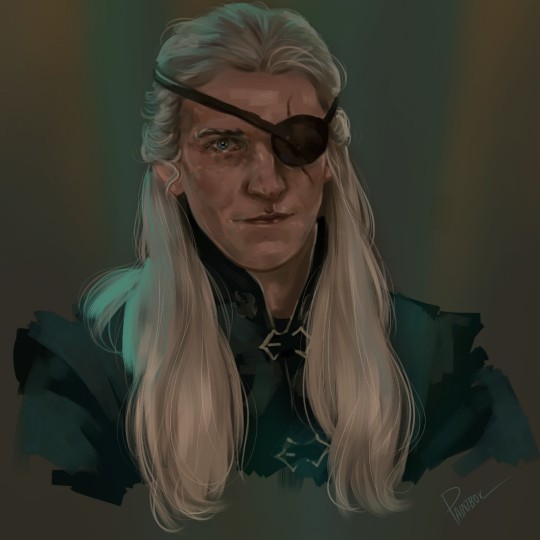
I'm such a noob at digital art, but I'm really trying my best. hope I'll be gaining more skill with time :)
2K notes
·
View notes
Text
i love paintings that look as if they have ghosts in them
85K notes
·
View notes
Note
In the book, Aemond seems to have quite an obsession with Daemon. Where do you think it comes from, and how would you interpret/characterize it ?
I’m still thinking about it in ways that aren’t already know or talked about in the current fandom and here on Tumblr. So bear with me here. I might do many edits on this post in the immediate and far futures.
In all, Daemon acts more out of love than Aemond does, even with him being as violent and brutal as he is. Daemon is flawed and cruel, while Aemond is evil and cruel. By and large, Aemond is a person who finds his personhood only through disenfranchising others. He is the potently evil shadow of Daemon. Aemond is a character who lacks love or a true understanding of respect and considers Daemon the beast to slay to solidify and validate his own existence, worthiness, and masculinity.
A)
Aemond is Daemon’s narrative and literary foil.
A foil is:
a literary device designed to illustrate or reveal information, traits, values, or motivations of one character through the comparison and contrast of another character. A literary foil character serves the purpose of drawing attention to the qualities of another character, frequently the protagonist. This is effective as a means of developing a deeper understanding of a character by emphasizing their strengths and weaknesses. In addition, a literary foil allows writers to create a counterpart for the protagonist that puts their actions and choices in context.
B)
Both
They are both fighters with skill. Both are brutal and willing to get violent (but in different ways and reasons). Both are Targaryens and proud of it. Both want the throne or a strong claim to it. Both are second sons tasked with the role of supporting their older, not-very-competent or completely incompetent brother to keep or gain the throne and are passionate about it (for different reasons). Both squirm with the thought that their existence and purpose is to support such brothers but for different reasons.
And as @theblackqveen says, they even both have a connection to Visenya the Conqueror through her dragon and her sword.
Daemon
1)
Daemon is uncaring of not-family people. Not hateful, just uncaring and thus willing to spill their blood if that will bring him results (Jaime Lannister). Canonically (not HotD), he is a charismatic, violent, and ambitious man. He creates the gold cloaks and inspires the preexisting city guardsmen into believing in their own validity and strengths by revamping their looks, etc.
His mother died when he was 3 from labor complications. Unlike Viserys who seemed to have responded to this by being too much a people pleaser, Daemon sought to completely look out for a small set of people he would think of as his family or “close ones”.
Baelon’s grief would have inspired such reactions from his sons--Viserys to be eager and affectionate, obviously caring. He wants to believe that hospitality and following a sense of duty to those around him will bring him love or contentment. He may have found it difficult not to judge Daemon for taking a “misguided” approach or path, so when Daemon disagrees with him or disobeys his order or does something that is conventionally upsetting, he may have found it difficult to relate to Daemon or see things from his persepctive. While Daemon would, in my mind, is outwardly or superficially crotchety and unwilling to seek/initiate obvious intimacy but needing to be validated through his family and loved ones. However, he doesn’t think words or hugs brings comfort or favorable outcomes--he depends on action.
So he develops his own moral compass that is just adjusted to “do these people act like I matter to them and do they matter to me” all the fucking time.
Daemon and Viserys would have still received the genuine love of their father, Baelon, and would have grown up together as caring brothers, enough that they would know they loved each other. We have reason to believe that his upbringing was still loving and that he maybe thought himself his brother and father’s caretakers. If not in traditional sense, in that he is the one who will do “what it takes” to keep them afloat. In his mind. Especially after his father passes form a “burst belly”, leaving him and Viserys alone. Seeing how Viserys is so eager for validation and willing to have others have a say in what he does, it makes sense that he falls into this protector role even deeper.
2)
He also wanted to be an example of excellence and make a name for himself, especially with being a second son and without a clear, solid inheritance of authority. Second sons in this feudal society are thought of as “spares” in one sense, since if their older brothers die they can take their place and inherit the family resources and the authority over the house. so he’d have felt more pressure to prove himself in the shadow of his brother (while he wasn’t much of a warrior or inclined to develop physical prowess, Viserys was also considered quite attractive before he gained weight).
3)
He supports Viserys in that he was wiling to use a group of fighters to go against Corlys and his group for Viserys’ claim before Jaehaerys I called for the Great Council of 101 A.C:
Reports had reached the court that Corlys Velaryon was massing ships and men on Driftmark to “defend the rights” of his son, Laenor, whilst Daemon Targaryen, a hot-tempered and quarrelsome young man of twenty, had gathered his own band of sworn swords in support of his brother, Viserys. A violent struggle for succession was likely no matter who the Old King named to succeed him.
(Fire and Blood; A Question of Succession)
Yet, at 16 Alysanne marries him to Rhea Royce (the Runestone heir), and while this was a good practical marriage for creating more ties to the Vale and setting up Daemon with some money through his wife’s properties, etc., Daemon did not like the atmosphere, look, anything of the Vale, probably how far away it was from King’s Landing/Viserys--thus the isolation.
Viserys did not let him annul his marriage to Rhea despite its failure and is the cause for how Mysaria lost her child with Daemon when he forced Daemon to bring back the dragon egg and send her off to Lys:
When he learned that his concubine was pregnant, Prince Daemon presented her with a dragon’s egg, but in this he again went too far and woke his brother’s wroth. King Viserys commanded him to return the egg, send his whore away, and return to his lawful wife, or else be attainted as a traitor. The prince obeyed, though with ill grace, dispatching Mysaria (eggless) back to Lys, whilst he himself flew to Runestone in the Vale and the unwelcome company of his “bronze bitch.” But Mysaria lost her child during a storm on the narrow sea. When word reached Prince Daemon he spoke no syllable of grief, but his heart hardened against the king, his brother. Thereafter he spoke of King Viserys only with disdain, and began to brood day and night on the succession.
(Fire and Blood; A Question of Succession)
4)
He was also not at all attracted to his new wife. So now he knows what it’s like to be a political tool, or he feels like more of a device than a person part of something “great”.
And so their marriage becomes barren (no kids). She comes to hates him too for not loving her home, for openly showing his disdain for it and for her, and perhaps she feels he is unwilling to do his duty like her and she feels resentment towards him and his ability to just fuck off while also being happier with him gone [headcanon].
Daemon doesn’t and never has considered her “family”, is the point. And not because of anything she did to him, but because she was someone who enables him to be in a position that he really does not want to be in and he believes it’s unlikely that he’d ever get any sort of glory or power all the way in the Vale, away from King’s Landing, away from the throne.
It’s also probable that she had a very different personality than his, thus convincing him even less to actually try to forge some sort of bond with her.
Laena and Rhaneyra, though? They both obviously had a lot more in common with him other than being dragonriders than he ever did with Rhea. Laena has her adventurous-ness and some daring, and Rhaenyra has pride and that “restlessness” that Viserys of HotD mentions, that unwillingness to accept a lot or assignment. They are also both his closer blood relatives, real family (remember that he grew up alone with his brother and father, a small set emotionally dependent on each other but also probably not that expressive). Those marriages were better for him, both personally and politically.
Daemon also named his kids after loved people in his life or people who will give love to his daughters. “Baela” -- “Baelon”. “Rhaena” -- “Rhaenys”. Viserys (II) after his own brother--Rhaenyra after her father and both to spite/oppose Alicent, to give their son the cloak of Targ-ness and kingliness: out of pride/love). Aegon (III) after Aegon the Conqueror (king-liness and house pride) & to spite/oppose Alicent.
5)
He strategizes more logically than Aemond does and is less prone to act on his anger. Contrast this QUOTE with THIS and THIS.
Aemond
1)
Aemond, by contrast, has little justified reason to hate Rhaenyra like Daemon hated or grew emotionally distant from Viserys.
While Alicent taught him to hate her, he still grew up with the assumption that he could and should destroy/rape people because his male, trueborness allows him to. His preoccupation with his maleness makes him think that he should usurp the heir, even though the law and precedent of “King’s word is law” (Viserys naming Rhaenyra as his heir and never straying) justifies his & the Greens’ treasonous actions.
Daemon, though he hated that Viserys named Rhaenyra as heir and not him, never actively tried to depose her or his own brother.
2)
While he grew up dragonless for 10 years, he was surrounded by family and Hightower supporters since birth who show no sign of mistreating him, at all -- unlike in the show. When he does claim Vhagar he does so at 10, which is impressive (while cradle-bonding is not as impressive or definitively not more so than Rhaenyra, though, who claimed Syrax at 7. Just saying).
He has a history where his mother teaches him and his siblings to see Rhaenyra as unfit because she has extramarital/maybe premarital sex with unassigned men and gave birth to illegitimate children. The V boys, in Alicent’s eyes, don’t deserve to live or inherit the throne because of what the Faith says about bastards and because they are in the way of her own hous, herown, and her children’s power. Bastards are socially stigmatized and unfavorable because they are believed to be inherently untrustworthy and evil (Faith of the Seven).
By having bastards, Rhaenyra acts “unwomanly” and against the standards set for her gender–how can she be a good ruler?!
To him, Rhaenyra is a whore and an inferior person, her sons lesser than himself because their bio parents weren’t married (rumored but we know who the daddy is, not that it matters), and duty and custom goes above everything else, as Alicent teaches him.
3)
So it is Aemond’s duty to make sure that Aegon gets the throne, and for that to happen, Rhaenyra needs to go. Preferably violently. Alicent and Otto both emphasized this to him and Aegon practically since birth, and he would have grown up with this being understood as his main and single purpose. Daemon is what he sees as the obstacle to that goal.
However, Daemon supported more out of love and regard than duty and to prove his own male privilege. But Aemond sees in Daemon a competitor because of those similarities I just listed under “Both” as well as being the person who supports the enemy of the Greens (maybe not the Visenya bit...I doubt Aemond ever seriously thought about how they share a piece of her or her beyond the idea that she was a “witch”, even though he rode her dragon and they both have a strong hand in usurping a rightful heir [Maegor vs Aegon the Uncrowned]). @hamliet says that Love is a transaction for the Hightowers.
53 notes
·
View notes
Photo
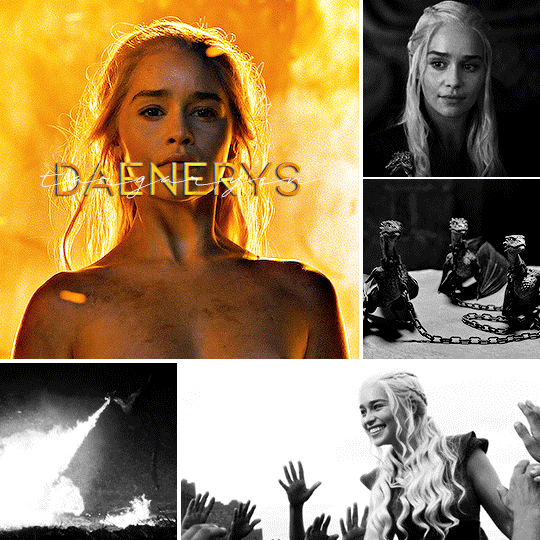

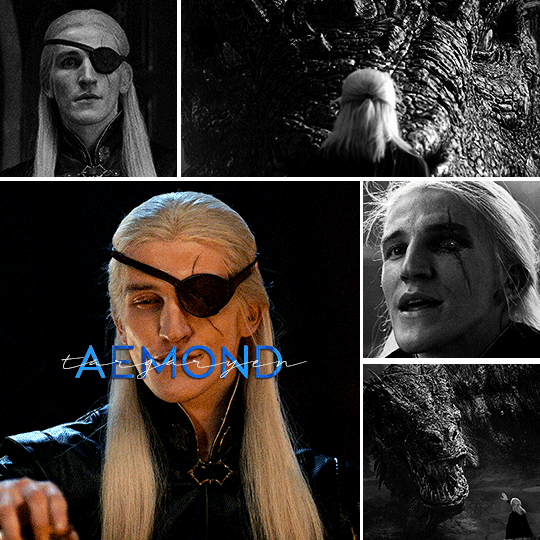

TARGARYEN WEEK
Day 1: Favorite Targaryens: (insp | layout)
Daenerys Targaryen
Shiera Seastar
Aemond Targaryen
Brynden ‘Bloodraven’ Rivers
398 notes
·
View notes
Text
been thinking about the rotting blue heart in the House of the Undying that seemed to nearly kill Dany and the Heart of Winter that made Bran cry. Drogon ate the blue heart, saving Dany, and destroying the HotU as a result. Dany also ate a raw stallion heart to give her son (the stallion who mounts the world, the title that actually belongs to Dany/Drogon) strength.
There's some foreshadowing there, right? Dany and Drogon (plus the other dragons/dragon riders maybe) are gonna eat the Heart of Winter? Dany consuming death itself? life eating death, fire melting ice, etc. Obviously the "Heart of Winter" might not be a literal and physical heart.
Bran eating the Heart of Winter through Summer; Summer literally consuming Winter. We see him eat while in Summer's mind in the books, it's an escape from his own nagging hunger. Hunger is for winter, feasting is for summer.
Eating as a celebration of life. I like this visual better than This Character strikes down the Big Bad with a sword. I also like it more than the three dragons simply burning whatever they see in the Heart of Winter. Eating is a celebration of life; I read a post awhile ago about how grrm puts so much Detail into his descriptions of food because of this. because it's all about celebrating life in the face of death, when you know Winter is Coming anyways.
400 notes
·
View notes
Text
i saw walder of house white making milk of the poppy with that urchin jessaerys
16K notes
·
View notes